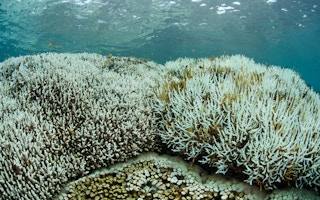The ocean and the atmosphere are linked in ways that are only just beginning to be fully understood. Like siblings, the sky above us and the waters around us share many characteristics – most notably these days a need to be protected. We are siblings working on a shared agenda to defend both – an agenda that will define the future for many millions of brothers, sisters, fathers, mothers, friends, and neighbors, as well as life-forms on the land and in the seas, now and for generations to come.
Fortunately, governments around the world are beginning to understand the challenge, and are expected to deliver – or at least make progress toward – two important agreements this year: a new global treaty to protect marine life in international waters, and a climate-change accord to safeguard the atmosphere. Together with a suite of Sustainable Development Goals, these agreements will serve as crucial road signs indicating the path to be followed by the world’s national economies over the next 15 years and beyond.
The planned accords come amid extraordinary efforts by countries, cities, companies, and citizens to protect the climate and the ocean. Investments in renewable energy are running at well over $250 billion a year, and many countries are spending as much on green forms of energy production as they do on fossil fuels.
Our native Costa Rica, for example, now gets 80 per cent of its energy from renewable sources. In China, renewables are expanding rapidly, and coal consumption fell by 2.9 per cent year on year in 2014. Meanwhile, offshore, the need for more marine reserves and sustainable fishing is being recognized and, in some cases, met, with technological breakthroughs strengthening officials’ ability to monitor and track illegal catches.
Scientists studying climate change have shown how the problem can be tackled by adopting a clear path with progressive milestones. We must bring global emissions to a peak in the next decade, drive them down rapidly thereafter, and establish a balance between emissions and the planet’s natural absorptive capacity by the second half of the century.
“
The ocean has historically played an important role in achieving that balance. As a natural carbon sink, it absorbs approximately 25 per cent of all the carbon dioxide emitted by human activity annually. But we are overtaxing its absorptive capacity.
The ocean has historically played an important role in achieving that balance. As a natural carbon sink, it absorbs approximately 25 per cent of all the carbon dioxide emitted by human activity annually. But we are overtaxing its absorptive capacity. The carbon dissolved in the ocean has altered its chemistry, driving up acidity by 30 per cent since the beginning of the Industrial Revolution. The rate of change is, to the best of our knowledge, many times faster than at any time in the last 65 million years, and possibly the last 300 million years.
If CO2 emissions are not brought under control, the rate of acidification will continue to accelerate – with deadly effects on the ocean’s inhabitants. As CO2 from the atmosphere is churned into the world’s waters, it reduces the availability of carbonate ions needed by many marine animals and plants to build their shells and skeletons. If CO2 levels continue to rise at their current rates, scientists estimate that around 10 per cent of the Arctic Ocean will be corrosive enough to dissolve the shells of sea creatures by 2018. Many other oceanic bodies face a similar future.
International agreements succeed best when the political, economic, and social trends of the time align, as they have now, to give rise to a new vision of the future and a new relationship between humanity and the planet we share. Realizing this vision will involve multiple generations. Both the ocean and the climate are in need of global, credible, measurable, actionable plans to provide for their protection. Our scattered, fully protected marine reserves must be expanded from the 1 per cent of the ocean they currently protect to form a truly global network.
Last month, 13 Caribbean heads of state and government called for an effective global agreement, citing current and emerging impacts. It is an alarming list: “more frequent extreme events, more intense and changing rainfall patterns, more ocean acidification and ocean warming, coral bleaching, rising sea levels, coastal erosion, salinization of aquifers, the greatly accelerated emergence of new communicable diseases, reduced agricultural productivity, and a disruption of fishing traditions.”
Such threats are proof of the urgent need to expand the international rules providing for the conservation and sustainable management of the climate and marine life. The climate-change agreement expected to be reached in Paris in December will not solve the problem at the stroke of a pen, just as no agreement to protect marine life will, on its own, lead to a healthier ocean. But it is essential that we establish the policy pathways needed to ensure that all countries play their part in protecting the planet, while assisting the vulnerable to adapt to the effects of environmental degradation already underway.
Christiana Figueres is Executive Secretary of the United Nations Framework Convention on Climate Change (UNFCCC). José María Figueres, Co-Chair of the Global Ocean Commission, is a former president of Costa Rica.
Copyright: Project Syndicate, 2015.
www.project-syndicate.org


















